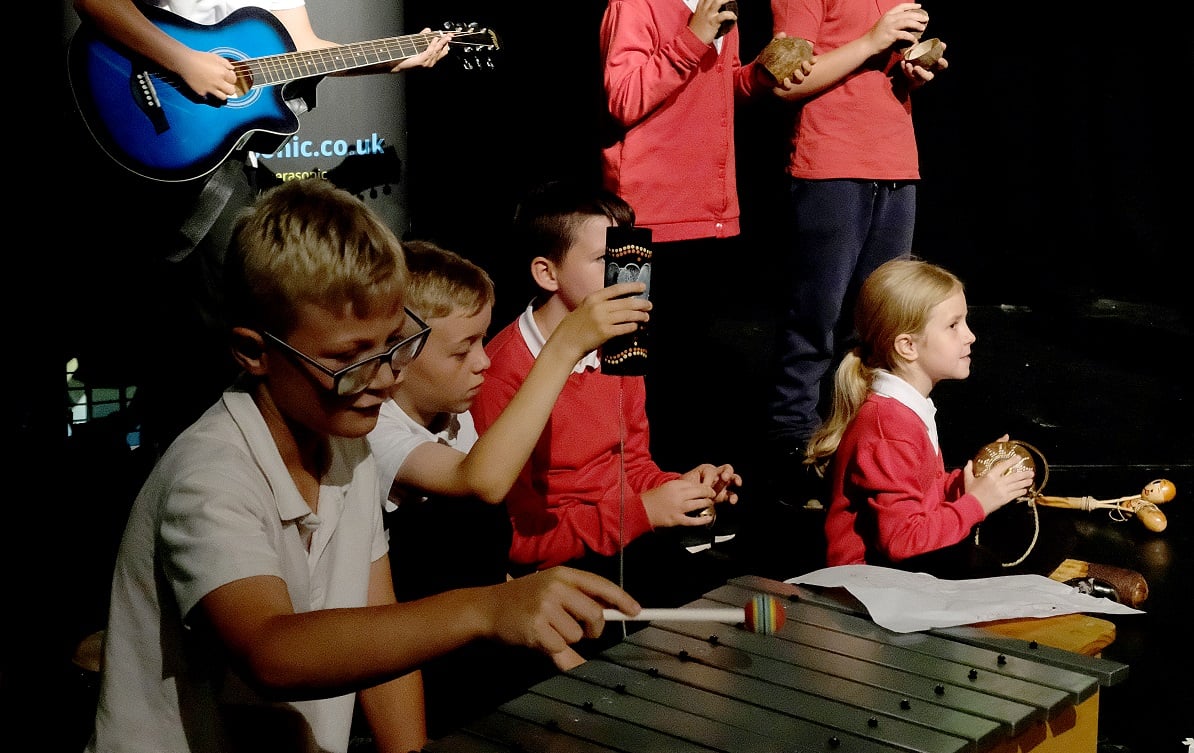
A 2019 Creative Collaboration project funded by the Arts Council of Wales
Photo: Operasonic
Wales to establish National Music Service in schools
The Welsh Government says it will deliver the long-awaited scheme to “make sure that lack of money will no longer be a barrier to young people learning to play an instrument”.
Wales will establish a National Music Service following a manifesto pledge to finally create a level playing field for music education.
The pledge follows years of debate over how best to address a growing inequality of opportunity.
Welsh Labour committed pre-election to establish a service that closed the gap and made sure that "a lack of money is no barrier to young people learning to play an instrument”.
READ MORE:
It has vowed to build on a 2020 Music Services Feasibility Study that identified a “lack of consistency and coherence” in music education in Wales, and deliver a long-awaited national plan for music education via a “sustainable, equitable and consistent model” that is free at the point of use.
As well as providing equal access for young people, the policy proposed “professional recognition, remuneration and access to continuing professional development” for music teachers.
The Welsh Government would not be drawn on any details but has confirmed it plans to establish the service. Its forthcoming Programme for Government will “focus on next steps,” a spokesperson said.
Conflicting messages
What form the service will take is still unclear. Developing a national plan that key stakeholders will sign up and adhere to will be an important first step to ensuring the consistent provision the country seeks.
The feasibility study concluded there was “strong support” for a national coordination and strategic integration – a costly route for the Welsh Government and an unpopular option among many music educators and professional organisations.
These groups have been working with the Department for Education to tackle inequalities.
Music Consultant Dinah Pye, who led a petition for a National Plan, believes consensus is building on a way forward.
“There are those who think a National Service will be a centralised one,” she said.
“That is not on the cards at present. The plans under discussion are based on the local need and delivery that exists, and how that might be eased into the new education curriculum for Wales.”
For Anthem CEO Rhian Hutchings any attempt to centralise music education would need careful consideration and wide consultation.
“I don't feel it’s useful to try and roll back to the 80s now.
“A number of strong, independent organisations are already delivering high quality services in different parts of Wales and collaborative conversations have been taking place about how they can work together to enable a more equal provision."
Flintshire’s Music Service is run by Theatr Clwyd. CEO Liam Evans-Ford believes Wales’ geography and uneven transport infrastructure would make a centralised service impractical.
“As far as we are aware no one is pushing for it and the people delivering services on the ground don’t want it.
“But there is an argument that coordination at regional level might bring economies of scale because some local authorities are very small and don’t have the money to develop a strong infrastructure.”
Postcode lottery
Former Minister for Education Kirsty Williams, a passionate advocate music in the curriculum, stepped down at the recent elections, leaving new minister Jeremy Miles to deliver the National Music Service.
The pledge could address persistent variability in the availability, affordability and take up of music in schools and boost the glacial pace of progress.
Little has changed since 2015, when a report revealed music in schools to be a “postcode lottery”.
Delivery structures vary hugely across the country: in Denbighshire, Wrexham Music Co-operative, a teacher-run non-profit, benefits all students in the county borough, while neighbouring Flintshire County Council last year handed the reins to Theatr Clwyd amid budget cuts.
In areas such as Gwent, a comprehensive music service is still run by the local authority; in Powys, where the county council’s service was withdrawn in the late 90s, it is up to individual schools to decide on music tuition.
The report said the “attitudes and priorities of school leadership teams” often determine whether students receive music tuition, and many view instrumental and vocal lessons as an optional “add-on”.
While England’s Music Education Hubs are supported by a ringfenced £76m fund, central government funding in Wales is negotiated by the Welsh Local Government Association and distributed through increasingly squeezed local authority budgets.
Conwy Council told a 2018 inquiry that its “cost neutral” music service tuition charged schools £42 per hour: “All but one primary school charge parents and most pass on the real cost,” the authority said.
“A growing number of pupils quit because they can’t afford it and we don’t know how many never start in the first place due to charges.”
Join the Discussion
You must be logged in to post a comment.